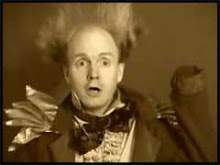 OBSERVE: Follow and Trip Assumptions
OBSERVE: Follow and Trip Assumptions
Elmer Fudd shoots into a rabbit hole and assumes that he's rabbit hunting. Bugs nonchalantly walks up to him and asks, "What's Up Doc?" putting Elmer's assumption into complete doubt. In one sentence, Bugs makes Elmer aware of his assumption and challenges it at the same time, which sets the stage for proving him wrong.
 Assumptions do a lot to frame reality. They are the rules of the games, and usually the ones least likely to be questioned. An assumption can be as entrenched as a long held belief, or as fleeting as a wild guess—but because you're the one who made the guess, you give it extra weight. The most difficult assumptions to get rid of are the ones that are true, and those very likely block an imaginative answer to a problem (I assume).
Assumptions do a lot to frame reality. They are the rules of the games, and usually the ones least likely to be questioned. An assumption can be as entrenched as a long held belief, or as fleeting as a wild guess—but because you're the one who made the guess, you give it extra weight. The most difficult assumptions to get rid of are the ones that are true, and those very likely block an imaginative answer to a problem (I assume).
Like kids, fools ask, "Why? Why? Why?" and the assumptions reply, "Because! Because! Because!" until they are finally worn down by the fools.
Because fools love obstacles, and assumptions are the biggest ones there can be, they'll live with their assumptions longer than necessary. They'll make them visible, follow them around in spy mode, even after the assumptions outlive their relevance, and if the self-consciousness doesn't eventually trip them up, then fools confront the assumptions, interview them, deny them, play with them, and then knock them over.
Ironically, it was assumptions that kept me from finishing this entry. I assumed that it had to be different from all the other creativity advice that encourages people to challenge assumptions. I assumed that this would be easy to write, because I trip up my assumptions all the time. I assumed that I'd finish it in a short amount of time. It wasn't until I asked what my assumptions were about writing this, that I was able to set them aside and just finish this.
List all the assumptions you have about a problem or project. Watch how they affect your approach to that problem or project. Tap into your inner Bugs Bunny, and question them. Keep the ones that help, get rid of the ones that don't, and use any ideas you got from temporarily or permanently abandoning them.
Think: What do I assume? Why do I assume this? What if my assumption is wrong? How can I change my assumption?
Next: How to Think Like a Fool #56: Listen to your Unconscious
Previous "How to Think Like a Fool" Posts




No comments:
Post a Comment